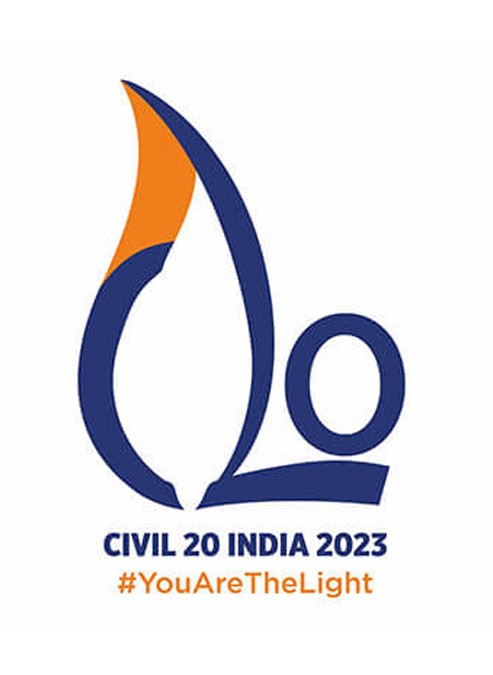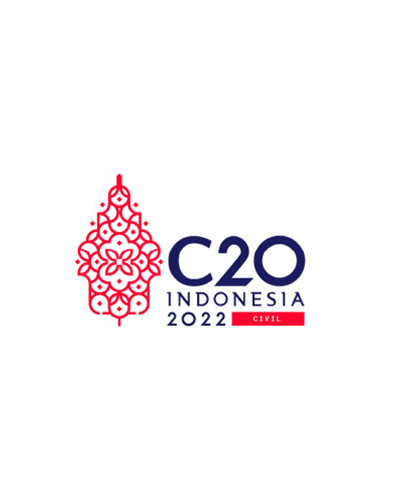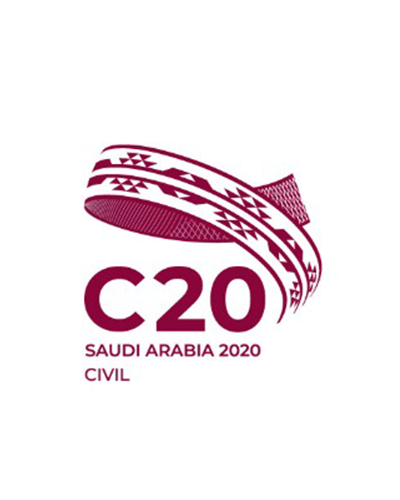Civil 20 (C20) se hizo oficial como Grupo de Compromiso del G20 en 2013. Desde entonces, el C20 se ha fortalecido cada año, asegurando que los líderes mundiales escuchen las recomendaciones y demandas de la sociedad civil organizada, buscando proteger el medio ambiente y promover el desarrollo social y económico, los derechos humanos y el principio de no dejar a nadie atrás.
Como parte del proceso del G20, el C20 desempeña múltiples funciones, que incluyen, entre otras: proporcionar experiencia y hacer que los gobiernos rindan cuentas de sus compromisos; buscar resultados positivos para la sociedad en su conjunto y; presionando por medios financieros efectivos y asignación de recursos para lograr esos resultados.
El C20 también puede proporcionar equilibrio, considerando que una de las mayores debilidades del G20, según la evidencia, ha sido otorgar a la sociedad civil el mismo nivel de acceso que brinda a los intereses empresariales. En un contexto en el que personas de todo el mundo creen que los gobiernos están demasiado cerca de las empresas o que sólo actúan en función de sus propios intereses, es vital involucrar a la sociedad civil para garantizar que las decisiones gubernamentales reflejen los intereses de los ciudadanos y sean dignas de su confianza.
Sin duda, el C20 es un importante contribuyente al proceso del G20 dado que, además de actuar como guardiana, la sociedad civil es el hogar de innovadores y expertos en tecnología, desarrollo sostenible, igualdad de género, emergencia climática, salud, educación y en todos los temas relacionados con el G20. , siendo capaz y siempre listo para brindar soluciones de vanguardia e ideas innovadoras a los gobiernos del G20 sobre los temas clave de nuestro tiempo.
Principios del C20
Durante la Cumbre del C20 en Tokio (2019), más de 800 representantes de la sociedad civil de todo el mundo aprobaron principios con el fin de proporcionar un marco general para todo compromiso posterior del C20 para garantizar la sostenibilidad y el creciente impacto de nuestro trabajo colectivo.
Uno de los compromisos de gobernanza del C20 es preservar e implementar estos principios, asegurando su observancia por parte de todas las personas que participan en el proceso.
Global character: C20 is the global space for civil society organizations and social movements from all over the world – from international NGOs to grassroots local groups – aiming to influence the G20. Any local, regional or international organization (whether from G20 or non-G20 countries) is welcome to participate in the C20. A regional balance should always be ensured.
Transparency: All preliminary and working drafts of C20 pronouncements or decisions should be circulated widely among participating organizations and opened to comment, and all final documents should be made widely available and accessible. Information regarding C20 leadership, structure, procedures, and outputs should always be timely, relevant, up-to-date and accurate. All C20 outputs must be developed through a transparent, inclusive and participatory process, to provide participating CSOs the opportunity to collaborate in drafting policy recommendations, including the cover statement of the C20 Policy Pack.
Independence: While welcoming input and open debate, ultimate decision-making and sign-off prerogatives on C20 positions belong to C20 member organizations. The C20 is the exclusive domain of civil society, mandated to carry out its work and develop its policy recommendations autonomously, that is, free from undue influence by any non-civil society actors.
Collaboration: To address issues of common interest, C20 is encouraged to cooperate with other engagement groups looking to enhance the impact of the C20’s work. Such cooperation must be based on balanced power relations, adequate consultation among C20 members and thorough discussions among all C20 structures.
Human Rights, Gender Equality and women’s empowerment: C20 opposes existing inequalities, forms of discrimination and all human rights violations. Gender equality is a fundamental human right, it is essential for promoting sustainable development and achieving the Sustainable Development Goals (SDGs).
Inclusiveness: C20 is a space for meaningful exchange and cross-country collaboration, which does not tolerate any form of discrimination, including those based on geographic location, gender, gender identity, sexual orientation, race, caste, language, age, ability, legal status (e.g., migrant, refugee and statelessness), ideology, religion or political belief.
Besides, since 2015, the C20 has aligned with the UN 2030 Agenda for Sustainable Development’s motto “Leave No One Behind” which emphasizes that development must be inclusive and equitable and that no one should be left behind in the pursuit of sustainable development.
Continuity: Although the overall themes and priorities of the C20 may vary from year to year, all C20 processes should be guided by the aim of reflecting the perspective and experience of civil society across a diverse range of topics, including those which civil society wants the G20 to address but are not currently on the G20 agenda. For that to happen, each C20 process should always build on its predecessors and ensure that the voices and experiences from different parts of the world are considered. The C20 structure outlined in section B is viewed as essential for maintaining this continuity.
Predictability: To contribute to the transparency of the C20, it is crucial to have clear schedules and processes in place that outline a step-by-step approach for every deliverable/product that will be produced for publication on behalf of the C20.
Gobernanza del C20
Para garantizar la participación, la transparencia y la continuidad, el trabajo del C20 está impulsado por una gobernanza estructurada por los siguientes ámbitos:
C20 Troika: The Troika structure allows for dialogue and coordination between the leading civil society organizations from the current, previous and following G20/C20 host countries.
C20 Chair and Co-Chairs: Responsibles for facilitating the C20 process, representing C20, structuring the Secretariat, choosing the C20 Sherpa, making pronouncements and dialogue with other actors involved in G20.
C20 Sherpa: Chosen each year by the Chair and Co-Chair, the C20 Sherpa is the main point of contact with external stakeholders (G20 representatives, international organizations, media, and other G20 engagement groups). Together with the Chair is also responsible for ensuring a fluent and effective dialogue among C20 Working Group Chairs, mainstreaming relevant areas of work and developing the C20 schedule, for approval by the SC and the IAC.
C20 Secretariat: Responsible for the administrative, financial and logistical coordination tasks.
International Advisory Committee (IAC): Composed by representatives of international CSOs with experience working within G20, the IAC’s main roles are to advise the Chair, the Sherpa and the Steering Committee on strategic decision-making and contribute to disseminating C20 recommendations among key stakeholders.
C20 Steering Committee (SC): It is the executive body responsible for ensuring that the C20 is an open and diverse space that facilitates a broad range of civil society views of the G20. It leads the production of recommendations, ensures the C20 Working Groups meet regularly among themselves and with government representatives and helps coordinate the agendas for C20 meetings. The SC works alongside and is advised by the International Advisory Committee.
El SC y el IAC están compuestos por OSC con experiencia en diversas áreas de participación del C20, invitadas por el Presidente y el Copresidente en función de dos criterios principales: experiencia de trabajo a nivel del C20/G20 y representación geográfica y temática. Debe considerar el equilibrio regional y de género, prestando atención a la representación de los grupos marginados y subrepresentados.
Para garantizar la continuidad en el IAC y el SC, al menos dos miembros de cada organismo deben permanecer en el ciclo anterior. Al mismo tiempo, el principio de rotación debería aplicarse tanto al SC como al IAC, y los miembros prestarían servicios más allá de tres años consecutivos sólo en circunstancias excepcionales. La comunicación debe ser fluida entre los copresidentes, los sherpa, el SC y el IAC para la toma de decisiones sobre cuestiones estratégicas y clave.





